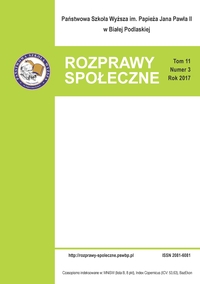Uwarunkowania prawne współczesnego bioterroryzmu
Legal conditions of modern bioterrorism
Author(s): Marcin Weiner, Karolina TarasiukSubject(s): Security and defense, Health and medicine and law
Published by: Państwowa Szkoła Wyższa im. Papieża Jana Pawła II w Białej Podlaskiej
Keywords: bioterrorism; law; BWC; microorganisms; biological weapons
Summary/Abstract: Bioterrorism is one of many forms of terrorism. Any kind of biological weapon used in a potential assault features a number of properties, such as ease and low cost of production, possibility to hide and transport, as well as its invisibility during the attack due to its lack of odour and colour. The first international legal act that addressed the issue of the use of biological weapon was the Geneva Protocol signed on June 17, 1925. The need to adapt the Protocol to the current political situation (terrorist attacks) forced the adoption of the 1972 Convention on the Prohibition of the Research, Production and Stockpiling of Bacteriological (Biological) and Toxin Weapons and their Destruction. Polish law does not directly include terrorist activities in the scope of its legislation. These are mainly addressed by the provisions of the Penal Code, which indirectly describes terrorism as a crime against common security which constitutes the threat of undermining the foundations of national defence, and the National Crisis Management Plan, which establishes the division of competences between different government administration bodies. A small number of national legal regulations stems from the fact that Poland is seen as a country with a low probability of a bioterrorist attack.
Journal: Rozprawy Społeczne
- Issue Year: 11/2017
- Issue No: 3
- Page Range: 22-29
- Page Count: 8
- Language: Polish

